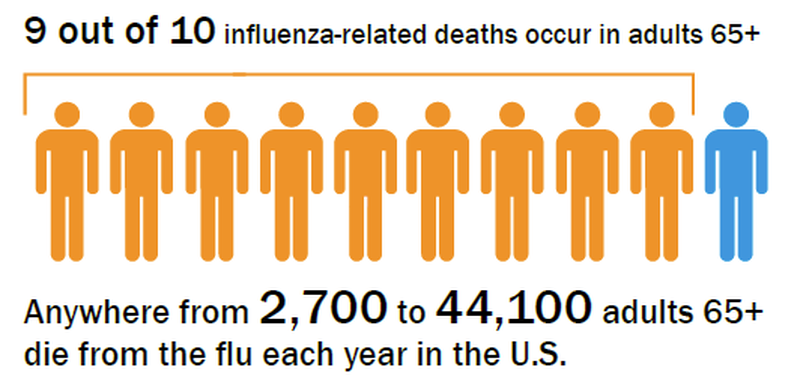For most people, the flu is nothing more than a few days spent dealing with runny nose, severe sneezing, some body aches, chills, and fatigue. It all starts settling down in a few days and you get better after a few days of rest. What you may not know is that flu can actually turn into a life-threatening condition. How does the flu kill you really? Is it that common for people to deal with something serious resulted from the common flu?
Well, the Center for Disease Control and Prevent released a report stating that more than 3,000 people died from influenza in 2009 alone. Moreover, about 49,000 people died between 2006 and 2007 due to certain influenza-related complications. It means you should look for the answer to your question, "How does the flu cause death?" Knowing about those factors is the only way to manage your situation better.

How Does the Flu Kill You?
The Answer
Okay, so, how does the flu kill you actually? It is true that most flu viruses don't lead to profound illness and may even go away in a few days with no lasting effects. Seasonal influenza is never that serious if you're young. Still, some people are more at risk of developing serious conditions triggered by the flu – it can be more serious for children, infants, seniors, and someone with compromised immune system. How does the flue kill you? The simply answer is that it kills when certain complications develop; usually these are pneumonia and worsening of the existing conditions.
Flu Complications That May Cause Death
Pneumonia
The researchers have already confirmed that the flu virus can be the underlying cause of your pneumonia, which is a lung infection exhibiting symptoms similar to the flu. It usually affects elderly people or adults over 45 years of age. Pneumonia with the flu is a lethal combination – it may reduce oxygen supply to your lungs and lead to fluid buildup that will damage your lungs and cause death.
Worsening of Existing Conditions
If you already have some existing conditions, the flu may make them all worse. You may have chronic obstructive pulmonary disease (COPD) or asthma, but your symptoms will become rather severe if you get flu as well. Similarly, you will notice your blood sugar levels changing if you're diabetic and get flu as well – this may even cause hyper glycaemia or diabetic ketoacidosis. It is therefore highly recommended to keep an eye on your blood sugar level if you have diabetes and get flu as well.
Other Flu Complications
Ear Infections
Children may end up dealing with certain types of ear infections caused mainly by the flu virus. These ear infections are usually the outcome of the inflammation in your throat and inner ear. Sometimes, the virus affects your inner ear directly and cause symptoms such as sneezing, running nose, and coughing with fluid buildup in the ear – this is especially common in children.
Seizure
Some children may experience seizures due to the flu, and it may cause a variety of neurological complications if your child is suffering from the swine flu. Even if your child has the seasonal flu and has fever as well, this may lead to "febrile seizure", a condition characterized by rapid jerking or twitching movements. This accompanies with fever exceeding 102 degrees Fahrenheit. These seizures don't usually cause any permanent damage and last for a couple of minutes only.
Premature Labor and Delivery
If you're pregnant and get the flu as well, you are more likely to develop some other complications. Respiratory infections are quite common in this situation and can cause pneumonia as well. These infections have their connections with low birth weight and increase chances of preterm birth. Your child may develop some neural tube birth defects if you suffer the flu with fever during your pregnancy.
Flu Vaccine – The Best Solution for Flu Prevention
You may have found the answer to your question, "How does the flu kill you?" As the flu can cause death sometimes, you should also understand that it is a good idea to take some steps and avoid getting flu in the first place. You may consider taking flu vaccine to increase your chances of not getting seasonal flu. Everyone above age six should get annual vaccination. You should talk to your doctor and take a flu shot if you have certain conditions or are more at risk of developing complications from influenza.
Who's at Risk
You're more likely to develop flu-related complications if you're over 65 years of age – children younger than 5 are also at high risk. You may have to deal with certain flu-related complications if you're pregnant, live in a nursing home, and are an American Indian or Alaskan native.
Sometimes, you may have to deal with certain flu-related complications when you already have certain medical conditions, such as asthma, blood disorders, kidney disorders, diabetes, liver disorders, or obesity. Things may become difficult if you already have a neurological or neurodevelopmental condition, such as disorders of the spinal cord, brain, muscle, and peripheral nerve, including epilepsy, cerebral palsy, intellectual disability, and muscular dystrophy. The flu may also complicate the situation if you already have a metabolic disorder, such as mitochondrial disorder or inherited metabolic disorders. Other specific conditions include heart disease, such as congestive heart failure and congenital heart disease; weakened immune system during cancer or HIV; or morbid obesity.

View All Comments /Add Comment